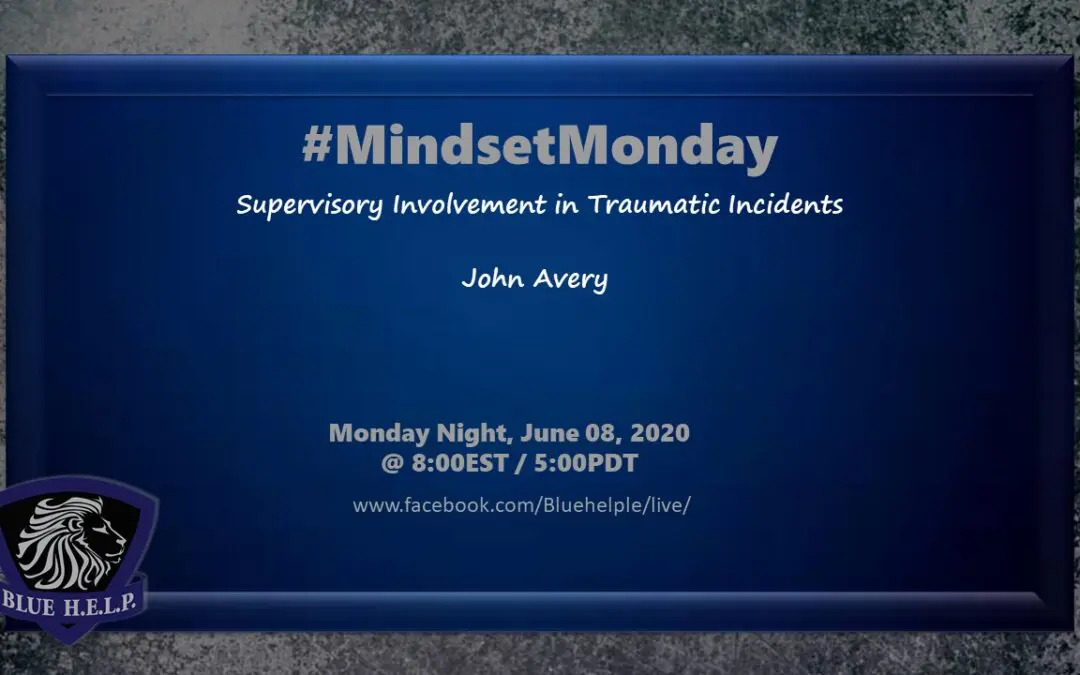Guest post by John Avery
Within the Public Safety Community there has been an increase in awareness of what individual officers and employees encounter and how they deal with traumatic incidents and cumulative stress. How an employee deals with these incidents and how an agency supports these employees as they deal with these issues is important to the survival of these incidents. As a former supervisor of line personnel, it became apparent that front line supervisors need to become aware of how trauma affects an individual, both in job related performance and their personal lives as both are intertwined.
Supervisors have an important role in the success or failure of personnel in how they treat and support the people they supervise. They not only train, supervise and mentor the people they supervise, but they maintain observations on how these personnel react and recover from the many challenges and stressors that they will encounter during the performance of their duties. Getting to know the people that you supervise will allow a supervisor to note changes in behavior, be aware of the stimuli that may cause adverse reactions in them and in doing so may be able to provide early interventions and support to those individuals who had to deal with a traumatic incident. This will hopefully build up their resiliency and better prepare them, both physically and mentally, for the next traumatic incident they encounter.
Realizing that every traumatic incident may produce a post-traumatic stress experience for those involved is an important consideration. These responses may differ among the personnel exposed to that trauma, and they will each have a different coping mechanism to help deal with that stress. Recognizing that individuals who process and deal with these traumatic incidents will respond in different ways will allow a supervisor the ability to recognize who may need help and who may not.
At the same time, supervisors need to be aware of the possibility of vicarious trauma that they may incur dealing with personnel who are dealing with cumulative or post-traumatic stress. The same thing that will affect the mental status of personnel exposed to a traumatic incident could also affect the mental status of the supervisor who may also be dealing with that traumatic incident. The supervisor is in the unique position that they must deal with the individual affected by the traumatic incident while they too are processing the incident on their own.
Traumatic experiences are impacted by the duration and intensity of the incident but are also further compounded by the frequency of recounting that incident or being exposed to other traumatic incidents that may occur at the same time. Personal experiences not associated with the traumatic incident may also influence or compound the traumatic experience that personnel may have been exposed to.
While agencies provide training for all physical aspects of the job requirements, little to no training is given on facing the mental challenges of the job. Personnel look to their supervisors for guidance, support, and resources to help them meet the challenges they will face. Supervisors need to seek out and engage appropriate mental health training that will provide them with a framework for assisting personnel who may go into crisis mode. These would include but not be limited to suicide prevention training, resiliency training, critical incident stress management training, peer support and mental health training. Read blogs, read books, read articles, educate yourself to educate others, promote mental health and wellness, attend wellness conferences and workshops that promote mental health, and by all means set the example for others to follow.
Links
Promoting Positive Coping Strategies in Law Enforcement
How trauma can Impact Police & Public Safety Professionals
Sergeant John Avery (Salinas PD Retired)
Avery, Loose & Associates, NAMI Cobb Affiliate
John Avery retired as a Sergeant from the Salinas Police Department after 24 years in service. John is a veteran of the US Army, worked as a Reserve Deputy Sheriff for Monterey County CA, and as a Correctional Officer for the California Dept. of Corrections and Rehabilitation in California. John has a Master of Science Degree in Emergency Services Administration from California State University Long Beach and is a graduate of the California POST Instructor Development Institute attaining Master Instructor status. He was the author and lead facilitator for the California POST certified course “Preventing Law Enforcement Suicide (PLES) Train the Trainer”. John is also a Georgia POST Instructor and has served as a Coordinator/Instructor/Facilitator/Advocate in the Georgia Public Safety Training Center CIT program, the NAMI (National Alliance for Mental Illness) CIT and First Responder training programs. He co-facilitates and teaches in the NAMI Georgia 8 and 16 Hr. course “Introduction to Behavioral Health and Addictive Disorders” and the CIT-Youth in Crisis Program. John is also a certified Mental Health First Aid Instructor facilitating Mental Health First Aid classes with certifications in the Adult, Youth, Veterans, Fire/EMS and Public Safety modules. John has also been a facilitator in the ASIST (Applied Suicide Intervention Skills Training) and QPR (Question Persuade Refer) suicide prevention programs.

